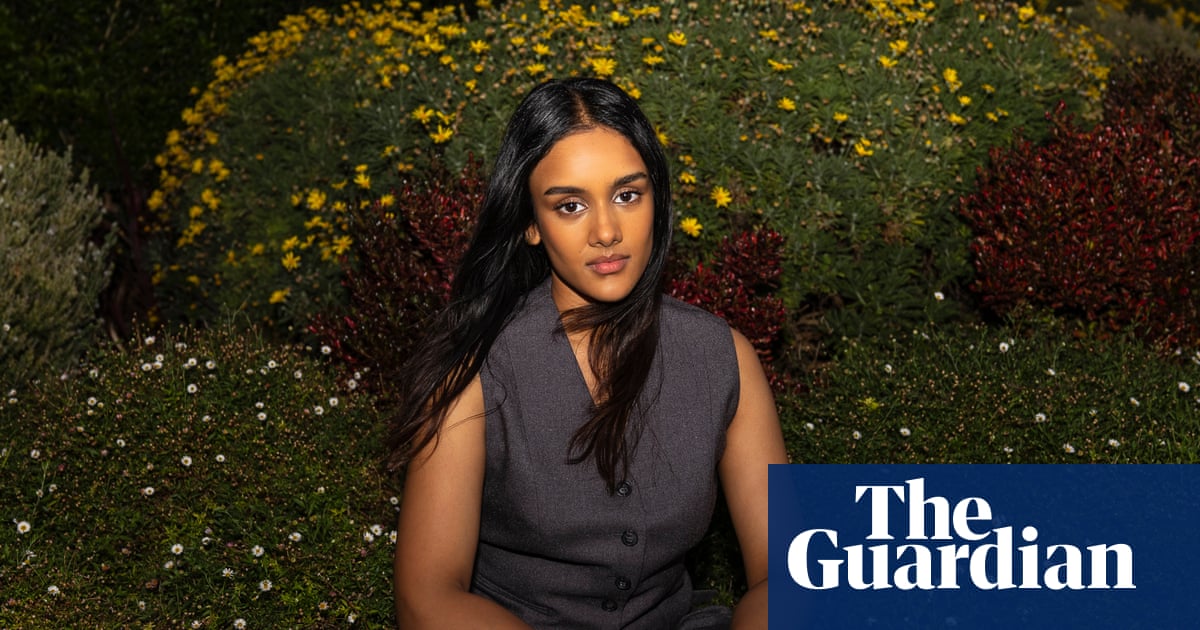It’s a familiar story: the Australian actor who ascends to LA for their international breakout, dizzied by the experience of being a small fish in a vast, alien pond. But this wasn’t the case forAdelaideborn-and-raised Shabana Azeez who, after making herself known through a string of boundary pushing, budget-poor Australian projects, has now leapt assuredly into the world of The Pitt: an instantly buzzy, hyperreal medical drama from the “creme de la creme of TV-makers in the world” – the team behind ER and The West Wing.
“I just want to be in things that people have never seen before. I just want to be working with people who have something to say,” says Azeez when we speak over the phone, her words tumbling quickly and with unbridled enthusiasm.
Set over the course of one frantic day in an underfunded and rat-ridden Pittsburgh emergency department, The Pitt follows an ensemble – led by veteran actor-producer Noah Wyle as Dr Michael Robinavitch – of doctors, nurses and overeager interns in real time as they endure and innovate against the odds. Season one has just finished airing, capturing legions of fans in a spell ofheartbreak, withaudiencesheralding its humane performances and sensitivity in broaching harrowing subjects. It is, of course, returning for a second outing next year.
Azeez shines as polite and precocious intern Victoria Javadi, who radiates hope even after fainting within her first hour on the job. “We experience healthcare workers as patients, [but] have we had empathy for them in all the ways we could have?” Azeez asks. “The Pitt is so political.” An understated fan favourite, Javadi goes on to have one of the series’ most striking character arcs, as she manages to face her overbearing surgeon mother and eke out brief moments for romance.
“I got the happiest experience that is humanly possible,” says Azeez of working on The Pitt after a surprisingly smooth casting process involving a single self-tape and a nine-minute Zoom call. “Everyone was telling me that America was going to be crazy, with all these huge personalities.” Reflecting the ethos of the show, where every worker proves to be essential, cast members weren’t divided into separate trailers. “Everyone was equal,” Azeez says. And everyone – including directors and producers – “came in wearing scrubs”. In their off-time, all the actors decompressed in a dark rec room. “It was a very Australian experience of making a show – no egos, no fancy bells and whistles.”
There are obvious similarities between Javadi’s enthusiasm and Azeez’s own infectious curiosity. She gushes about the “bootcamp” that preceded The Pitt, which involved extensive training in suturing methods, intubating dummies and performing real ultrasounds on actors.
The avid reception to the show has been a welcome surprise for Azeez. Only a few years ago, becoming an actor seemed like an impossible pipe dream. Idolising dramatic heavyweights such as Saoirse Ronan and Jennifer Lawrence as a teenager, Azeez always wanted to be a performer but the profession was forbidden by her parents. She ended up yearning from the sidelines as an arts administrator in early adulthood, adamant that “the ship had sailed”. “At 21, all the actors I was working with … had been acting since they were eight or had gone to drama school,” she says.
Soon, she became immersed in Adelaide’s grassroots film-making scene. She met now-longtime collaborators Leela Varghese and Emma Hough Hobbs, who cast Azeez in their early short films and would go on to facilitate her “humbling” and “rewarding” voice-acting debut in their sci-fi animated comedy Lesbian Space Princess, which premiered at Berlin film festival earlier this year and screens in Australia at Sydney film festival this June. “I am so glad I’m from Adelaide,” says Azeez. “I know not many people say that, but to me, because I didn’t go to drama school, I really came up making short films with my friends.”
Azeez’s unimpeachable love of the process also came into play for her feature film debut in 2023’s Birdeater, a high-octane psychological thriller about noxious masculinity that quickly garneredinternationalattention. Despite its small budget, Covid disruptions and flooded shooting locations, Azeez describes the film as “lightning in a bottle”. She plays the suspiciously sedate bride-to-be Irene, who is convinced by her fiance, Louie, to join a bachelor party weekend in an isolated cabin. As the trip becomes a nang and ketamine-fuelled spectacle of paranoia and violence, we witness Louie’s increasingly horrific control over Irene.
“Often we want victims to be perfect, and we want perpetrators to be evil,” says Azeez, who sought to crack the mould of survivor representation. “I really wanted to make [Irene] as invisible as possible in that film, so that no one even noticed she was there. I didn’t want to make her funny or charming or light up rooms … because I really wanted you to fall in love with the boys and at the end of the film realise what you’ve done.” Azeez’s approach was informed by on-the-ground research, interviewing everyone she could about coercive control. “Whenever I explained it, every single woman had a story.”
Despite the intensity of Azeez’s burgeoning career, she shows no signs of exhaustion. Beyond the “surreal” reception to her latest venture, she can’t wait to get back into her “bloody scrubs and worn-in Nikes”. It’s hardly glamorous – “but it looks like that from the outside,” she says. “Maybe that’s just how acting works, but I guess I’ll learn that in the next few years.”
Season two of The Pitt will premiere in 2026.Lesbian Space Princessscreens at the Sydney film festival before a national release in September
